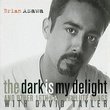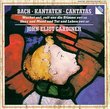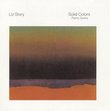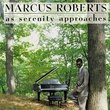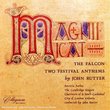| All Artists: Georges Gurdjieff, Thomas de Hartmann, Vassilis Tsabropoulos, Anja Lechner Title: Gurdjieff, Tsabropoulos: Chants, Hymns and Dances Members Wishing: 2 Total Copies: 0 Label: ECM Original Release Date: 1/1/2004 Re-Release Date: 9/28/2004 Genre: Classical Styles: Chamber Music, Historical Periods, Classical (c.1770-1830) Number of Discs: 1 SwapaCD Credits: 1 UPC: 602498196137 |
Search - Georges Gurdjieff, Thomas de Hartmann, Vassilis Tsabropoulos :: Gurdjieff, Tsabropoulos: Chants, Hymns and Dances
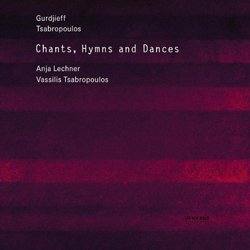 | Georges Gurdjieff, Thomas de Hartmann, Vassilis Tsabropoulos Gurdjieff, Tsabropoulos: Chants, Hymns and Dances Genre: Classical
Philosopher, seeker after the truth, reconciler of science and religion, teacher, guru to artists, writers and musicians, Gurdjieff was an enigmatic figure; even his birthdate is uncertain: 1866 or 1877. He taught movement... more » |
Larger Image |
CD DetailsSynopsis
Amazon.com Philosopher, seeker after the truth, reconciler of science and religion, teacher, guru to artists, writers and musicians, Gurdjieff was an enigmatic figure; even his birthdate is uncertain: 1866 or 1877. He taught movements "to alter or heighten consciousness" at his Institute for the Harmonious Development of Man, located outside Paris---a highly improvisatory process for which he composed equally improvisatory music. Technically untrained, he depended on skilled assistants to realize and write down his ideas, and found one in a devoted disciple: Ukranian pianist/composer Thomas de Hartmann, who selflessly suspended his own career and, after Gurdjieff's death in 1948, privately published and recorded some of their collaborations. As a composer, Gurdjieff, born at the border of Armenia and Turkey, was influenced by the region's ethnic and cultural diversity, by his childhood memories of the religious and philosophical songs improvised by his father, a Greek troubadour, by the hymns of the Greek Orthodox Church, and by his extensive travels through Europe and Asia. For this recording, the performers themselves arranged his compositions for cello and piano, adding five pieces by pianist Tsabropoulos, including three based on Byzantine hymns. Both players have been involved with Armenian, Ukranian and Greek Orthodox music; both are expert improvisers. Their strong feeling and affinity for the material allows them to approach it with both reverence and freedom; the playing is primarily subdued and inward. The piano texture ranges from delicate tinkling to full-blooded chords and arpeggios; the cello, playing mostly in the low and middle register, often in unison with the piano, sounds dark, warm and beautiful. The music, except for one lively dance, is slow, solemn, and mournful, in the minor mode. Melodies featuring oriental intervals are elaborated but not developed; based on single-note drones, harmonies are static or move in stepwise progressions but do not modulate. This lack of contrast and variety creates an otherworldly, disembodied atmosphere, despite several buildups of motion, dynamics, and intensity. --Edith Eisler Similarly Requested CDs
|
CD ReviewsANOTHER GREEN WORLD Kerry Leimer | Makawao, Hawaii United States | 02/22/2005 (5 out of 5 stars) "Properly direct, unadorned production, clear tonality and 72 minutes of interior calm. I can't speak for either the ideas or beliefs of Gurdjieff -- or de Hartmann -- and I can't honestly say how they might be reflected in this music, but "Chants, Hymns and Dances" accomplishes two things. First, the music is thoroughly tranquil without being shallow, or just pretty, or simply slow and empty. This sets both the music and the performances apart from a lot of "meditative" recordings that too often yield to an overly static, conservative drone. The pieces here are active and consistently engaging. The second is a little harder to define. While the liner notes present a good deal of information about the influences of various ethic musics, those stylistic references are frankly fairly well contained. This is not a "world music" recording. There is simply never a sense of the foreign here -- by "foreign" I mean in the sense of 'I've got something in my eye' -- as might be accomplished by the sudden incursion of, say, ancient Greek music. The references are well-proportioned, never overstated and generally act as a subtle coloring to the surrounding mass of each piece. In short, the music is wholly recognizable to western ears without seeming every-day or too familiar. There is also a seamless transition to and from the music of the pianist on this recording, Vassilis Tsabropoulos. His compositions come across -- almost -- as well-devised improvisations based on the Gurdjieff pieces, and reflect the same sense of inner purpose. Throughout this CD, his playing is very well tuned to the subtle emotional states of the music, even while simply playing dotted rhythms on octaves below the very expressive violincello work of Anja Lechner. That said, the emotional range is a narrow one of quiet and yearning. It's frankly a treat to listen to an entire CD of music essentially uninterested in bold contrasts, violent tempo change or harsh dynamics without the music ever slipping into an ignorable, two-dimensional, ambient pleasantness. Instead, the music and the performances invite active listening from beginning to end. "Chants, Hymns and Dances" achieves a rare and curious balance." Haunting Bluejack | Seattle, WA | 01/10/2005 (5 out of 5 stars) "The music is simple, yet subtle; Anja Lechner on violoncello, and Vassilis Tsabropoulos on piano together weave a full texture of unforgettable music. Most of the album us based on melodies by Gurdjieff, around a trio of pieces by Tsabropoulos. The whole is serene, mournful, inspiring. This is a quiet, peaceful disc, and yet it's not the kind of thing you'll probably play as background music. Something about these melodies works its way right *below* your consciousness, so that you want to really listen to it, really lose yourself in it. There are no lyrics, no voices, and yet these "chants" seem to strive to communicate something exquisitely beautiful, something tragically forgotten. For me, listening to this music feels like being hopelessly in love; but with someone who lived a thousand years ago. Perfect. Impossible. Heartbreaking." Must have! K. Eksi | New York, NY | 01/12/2006 (5 out of 5 stars) "This amazingly beautiful album to me is the soundtrack of Anatolia, of an era gone by when Turks, Greeks, Armenians and other ethnic groups shared their lives peacefully and harmoniously. Its sadness inevitably reminds me of millions who unnecessarily died on this soil in many wars fought in early twentieth century, of people forced to leave the only land the knew for unknown destinations and destinies, of the unimaginable hardships endured by its people. And more personally it takes me fom New York and puts me right next to my father's grave in a forgotten Anatolian village, 6000 miles away."
|

 Track Listings (16) - Disc #1
Track Listings (16) - Disc #1
